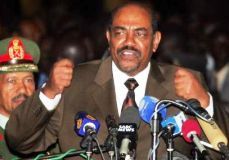Sudan govt, SPLM sign deal paving way to peace
By Wangui Kanina
NAIVASHA, Kenya, Dec 31 (Reuters) – Amid singing and whoops of joy, Sudan’s government and southern rebels signed the final chapters of a peace deal on Friday, paving the way for a comprehensive accord ending Africa’s longest-running civil war.

|
|
Sudanese President Omar al Bashir addresses after the signing ceremony of two protocols with southern Sudanese rebels in Naivasha, west of Nairobi, December 31, 2004. (Reuters). |
Middle-ranking officials of the government and rebel Sudan People’s Liberation Movement (SPLM) signed the last two of eight peace protocols that together make up an overall accord ending 21 years of war in the oil-producing south, witnesses said.
“In signing these two protocols the parties have succeeded in meeting their own deadline,” chief mediator Lazarus Sumbeiywo told a signing ceremony, referring to promises both sides made to the U.N. Security Council to agree a deal by the end of 2004.
In January both principal negotiators — Garang and Sudanese First Vice President Ali Osman Mohamed Taha — are expected to hold a ceremony where for the first time they will sign the eight deals agreed by junior colleagues in two years of talks.
“The two parties did not shy away from making the decisions necessary to bring peace,” Sumbeiywo, a Kenyan, told a ceremony attended by Sudanese President Omar Hassan al-Bashir, South African President Thabo Mbeki and SPLM leader John Garang.
The accords do not cover a separate conflict in the western Darfur area of Africa’s largest country, where more than a year of fighting has created what the United Nations says is one of the world’s worst humanitarian crises.
But diplomats believe a north-south deal could be a blueprint for peace in Darfur.
The combatants pledged in November to sign a final peace by the end of the year to end the conflict in the south that has killed an estimated two million people, mainly through famine and disease, and uprooted four million.
PRELIMINARY PROTOCOLS
Khartoum has already signed six preliminary protocols with the southern rebels under which they would form a coalition government, decentralise power, share oil revenues and integrate the military. In six years the south can vote for secession.
In the mainly animist and Christian south rebels have been fighting the government since 1983, when Khartoum tried to impose Islamic law on the entire country. Issues of oil, ethnicity and governance have complicated the conflict.
The United States and others have put strong diplomatic pressure on Sudan to wrap up the southern peace, so that Khartoum can focus on ending the separate crisis in Darfur that has overshadowed the much older southern war.
“It will change the political landscape in Khartoum. I think it will create a new opportunity to tackle the Darfur problem, and that is what we are hoping will come out of this,” U.S. Ambassador to Kenya William Bellamy told Reuters.
But a leader of one of Darfur’s rebel groups said that only fair deals for all the marginalised people of Sudan would bring a lasting peace in Africa’s largest country.
“The agreement that is being signed today is partial agreement,” Sudan Liberation Army chairman Abdel Wahed Mohamed al-Nur told Reuters by telephone from Darfur. “We in the SLA inform the government and SPLM clearly that this may be a step but is in no way a solution to the problem of Sudan.”
The Security Council has asked the United Nations, the World Bank and others to devise a reconstruction plan, including possible debt relief, for Sudan once the country is at peace.
Taha has said long-term plans would need $1.8 billion in aid over three years, but diplomats estimate any package would reach $500 million at the most.
The two protocols signed on Friday cover a permanent ceasefire and turning the agreements into reality on the ground.
(Additional reporting by Bryson Hull)
